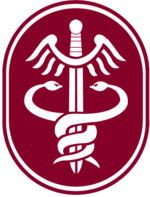Madigan Army Medical Center
| Madigan Army Medical Center | |
|---|---|
 | |
| Geography | |
| Location |
9040 Jackson Ave Tacoma, Washington, United States |
| Organization | |
| Hospital type | Military |
| Services | |
| Emergency department | Level II trauma center[1] |
| Beds | 205 |
| History | |
| Founded | 1944 |
| Links | |
| Website | mamc.amedd.army.mil |
| Madigan Army Medical Center | |
|---|---|
| Active | 1944 - present |
| Country | United States |
| Branch | United States Army |
| Type | Hospital |
| Garrison/HQ | Joint Base Lewis McChord, Washington |
| Motto(s) | "Care With Compassion" |
| Commanders | |
| Current commander | Colonel Michael L. Place, M.D. |
| Insignia | |
| Identification symbol |
 |
Madigan Army Medical Center, located on Joint Base Lewis-McChord just outside Lakewood, Washington, is a key component of the Madigan Healthcare System and one of the largest military hospitals on the West Coast of the United States.
The hospital was named in honor of Colonel Patrick S. Madigan, an assistant to the U.S. Army Surgeon General from 1940 to 1943 who was also known as "The Father of Army Neuropsychiatry." On September 22, 1944, Madigan General Hospital was named in his honor.
The hospital today is a 205-bed Joint Commission-accredited facility, expandable to 318 beds in the event of a disaster. Major services include general medical and surgical care, adult and pediatric primary care clinics, 24-hour Emergency department, specialty clinics, clinical services, wellness and prevention services, veterinary care, and environmental health services.
Madigan Army Medical Center received designation as a level 2 trauma center by the Washington State Department of Health in 1995, and has maintained level 2 status to the present day. Madigan Army Medical Center is one of three designated trauma centers in United States Army Medical Department (AMEDD). In 1999, Madigan became the second military hospital to ever receive a perfect score of “100” from Joint Commission.
Construction of the current facility was completed in the early 1990s. Prior to the opening of the building, the hospital consisted of a network of connected single-story buildings that are still utilized by the Madigan Healthcare System.
Deployment and Readiness Medicine
Madigan Army Medical Center and other Madigan Healthcare System facilities provide medical support to the Army and Air Force units of Joint Base Lewis-McChord at home and abroad.
PROFIS is only for medical Soldiers, and mostly affects doctors and commissioned nurses. The system designates qualified active Army AMEDD personnel working in non-deployable units like Madigan, and directs them to fill a unit activated to deploy. The tour length is different for every PROFIS Soldier, with most doctors and nurses going overseas for six months to a year.
After criticism from PETA, Madigan Army Medical Center announced in 2013 that it would no longer use ferrets in pediatric intubation exercises.[2]
Graduate Medical Education (GME)
Graduate Medical Education (GME) training programs at Madigan Army Medical Center are offered only to military officers in the Armed Forces. This institution does not participate in the National Resident Matching Program.
![]() This article incorporates public domain material from the United States Government document "Madigan Army Medical Center".
This article incorporates public domain material from the United States Government document "Madigan Army Medical Center".
Allegations of war stress treatment issues
The alleged perpetrator of the Kandahar massacre was based at Joint Base Lewis-McChord (JBLM). Before and after the massacre questions were raised about the quality of medical treatment and psychological diagnostics at Madigan. The center was under investigation because of allegations that the center's staff downgraded diagnoses of post-traumatic stress disorder for 300 service members to lesser conditions.[3] The center's chief, Colonel Dallas Homas, and mental health chief, William Keppler, were placed on administrative leave during the inquiry. Keppler had reportedly told the center's staff that a diagnosis of PTSD costs the military $1.5 million over each servicemember's lifetime in health benefits and disability payments. A forensic psychologist at the center, Juliana Ellis-Billingsley, confident that doctors at Madigan were properly diagnosing Madigan patients using the highest mental health standards, resigned on 23 February 2012 due to what she apparently believed was undue pressure being brought on the Madigan physicians by politicians and DoD leadership in Washington D.C. to make PTSD diagnosis that were not consistent with the legitimate medical standards. In her resignation letter, Dr. Billingsley stated, "I find that I can no longer work in a system that requires me to sacrifice my professional and moral principles to political expediency." in her resignation letter.[4][5][6][7]
In the wake of Pentagon and Congressional scrutiny the Army reluctantly[8] released a 100-page report, dated April 1, 2012 that backs Madigan commander Col. Dallas Homas, and supports the manner in which the hospital carried out forensic psychiatric evaluations before accusations of reversing PTSD diagnoses. The report also concludes that Homas never influenced PTSD diagnoses, and that whistleblowers were misinformed in their criticism.[9]
Military support groups around the base have alleged that base commanders did not give returning troops sufficient time to recover before sending them on more deployments. The groups have also alleged that the base's medical staff is understaffed and overwhelmed by the numbers of returning veterans with deployment-related medical and psychological trauma. Since 2003, 68 servicemembers stationed at the base have committed suicide, with 16 taking their own lives in 2011. Other US Army bases, however, such as Fort Hood, Fort Campbell and Fort Bragg, have experienced higher rates of suicide and similar crime rates.[3][6][10][11][12][13][14]
Soldiers from the base have been linked to other atrocities and crimes. The 2010 Maywand District murders involved JBLM-based soldiers.[3] Also in 2010, a recently discharged AWOL soldier from JBLM shot a police officer in Salt Lake City.[11] In April 2011, a JBLM soldier killed his wife and 5-year-old son before killing himself.[6] In January 2012, a JBLM soldier murdered a Mount Rainier National Park ranger.[3] Two JBLM soldiers have been charged with waterboarding their children.[6] Jorge Gonzalez, executive director of a veterans resource center near Fort Lewis, said that Kandahar's killings offer more proof that the base is dysfunctional: "This was not a rogue soldier. JBLM is a rogue base, with a severe leadership problem", he said in a statement.[15] Base officials responded, saying that the crimes committed by its soldiers were isolated events which don't, "reflect on the work and dedication of all service members."[16] Robert H. Scales opined that conditions at JBLM were not necessarily an underlying factor in the shootings, instead suggesting that it was the 10 years of constant warfare in Iraq, Afghanistan, and elsewhere, and the repeated deployments required of the US's overtasked military.[17]
See also
Notes
- ↑ "Washington State Department of Health Trauma Services" (PDF). Washington State Department of Health. October 2015.
- ↑ Ashton, Adam (4 September 2013). "Army Hospital Ends Training on Ferrets". Military.com. Retrieved 9 March 2015.
- 1 2 3 4 Whitlock, Craig, and Carol D. Leonnig, "Seeking Clues In Afghan Killings", Washington Post, 13 March 2012, p. 1.
- ↑ //blog.thenewstribune.com/military/2012/03/05/madigan-psychiatrist-ptsd-diagnoses-were-fixed-at-walter-reed/
- ↑ Finn, Peter; Leonnig, Carol D. (14 March 2012). "Afghan shootings refocus attention at Fort Lewis-McChord base". The Washington Post.
- 1 2 3 4 Finn, Peter, and Carol D. Leonnig, "Shooting Of Civilians Refocuses Attention On Lewis-McChord Base", Washington Post, 14 March 2012, p. 16.
- ↑ Bernton, Hal, "40% Of PTSD Cases Reversed", Seattle Times, 21 March 2012, p. 1.
- ↑ http://seattletimes.com/html/localnews/2020326220_armyinformationxml.html
- ↑ //blog.thenewstribune.com/military/2013/03/15/army-releases-investigation-into-madigan-ptsd-complaints-read-excerpts-and-full-report-here/
- ↑ Yardley, William, Serge F. Kovaleski and James Dao, "Home Base Of Accused Soldier Has Faced Scrutiny", New York Times, 14 March 2012.
- 1 2 Murphy, Kim, "Soldier Held In Killings Is From A Troubled Base", Los Angeles Times, 13 March 2012, p. 1.
- ↑ Trofimov, Yaroslav, Adam Entous and Joel Millman, "Afghan Massacre Ended As Search Began", Wall Street Journal, 13 March 2012, p. 7.
- ↑ Bernton, Hal, "Rampage Shines New Light On Multiple War-Zone Tours", Seattle Times, 13 March 2012, p. 1.
- ↑ Hill, Christian, and Adam Ashton, "Is Lewis-McChord A 'Troubled Base'?", The News Tribune, 18 March 2012.
- ↑ "Lewis-McChord soldier accused in killings of Afghan civilians". KATU. 11 March 2012.
- ↑ Martin, Jonathan, "Lt. Colonel Charged In Flurry Of Threats", Seattle Times, 14 March 2012, p. 1.
- ↑ Scales, Robert H., "Consumed By Wars Without End", Washington Post, 14 March 2012, p. 15.
External links
| Wikimedia Commons has media related to Madigan Army Medical Center. |
Coordinates: 47°6′31.5″N 122°33′7.46″W / 47.108750°N 122.5520722°W
